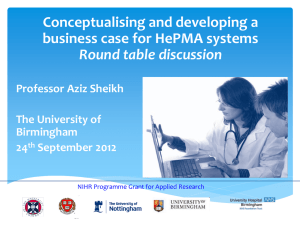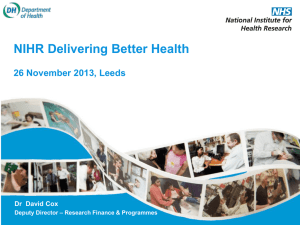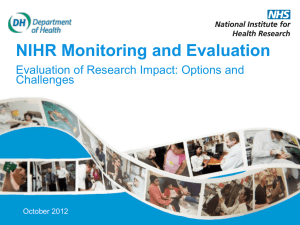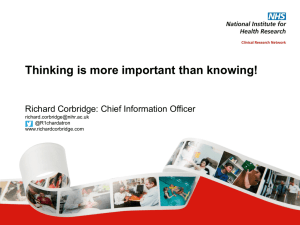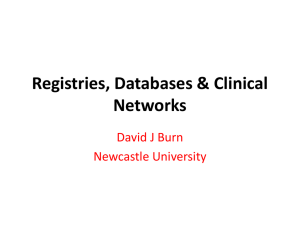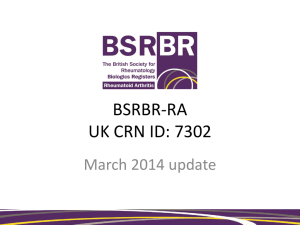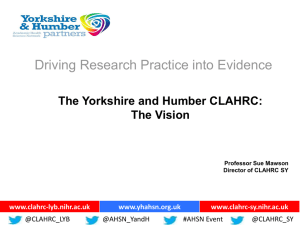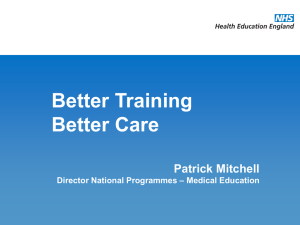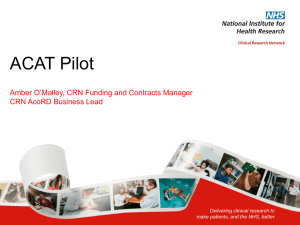Welcome to the NIHR - Delivering Better Health
advertisement
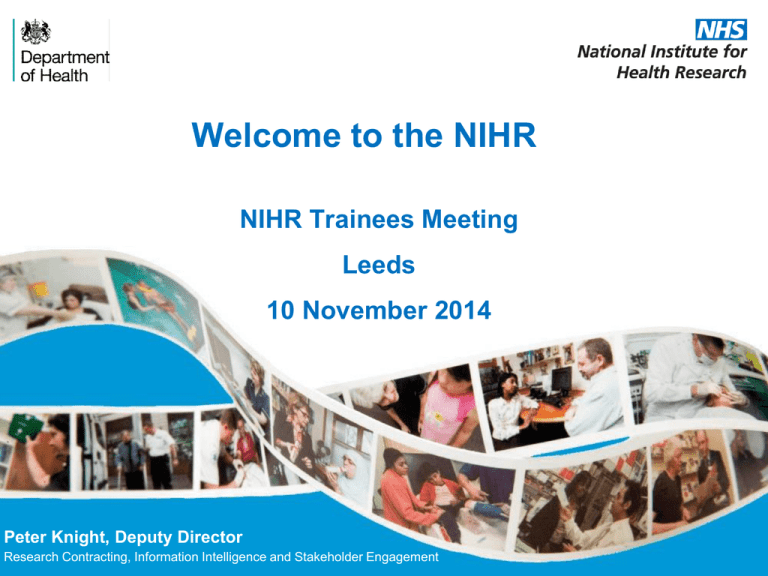
Welcome to the NIHR NIHR Trainees Meeting Leeds 10 November 2014 Peter Knight, Deputy Director Research Contracting, Information Intelligence and Stakeholder Engagement Why is the Government committed to Research in the NHS? •improve health outcomes through advances in research •improve quality of care by NHS participation in the research process •strengthen International competitive position in science •drive economic growth through investment by life science industries The UK’s global R&D impact on health related fields The UK’s relative share of world outputs-2010 The UK’s citation impact2010 Significant economic benefits National Institute for Health Research Established 2006 as a vehicle for implementing the Government’s strategy for applied health research Strategic Aim To improve the health and wealth of the nation through research What is NIHR and what does it do? • • • The NIHR is the largest funder of clinical research in the country: Wellcome £746m; MRC £767m; NIHR about £1bn It supports clinical and applied health & social care research to improve health, well-being and prosperity It is internationally recognised as the model for organising a health research system National Institute for Health Research Partnership • • • • • • Between Government, Charity and Industry Between NHS and University Between research leaders and research facilitators Between different health care professions Between different research disciplines Between researchers and patients A Health Research System An integrated health research system • The different parts of the health system support each other • Basic science relies on NIHR funding for pull through to patient benefit • Anchoring industry depends on NIHR-funded infrastructure • Research charities depend on the NIHR Clinical Research Network • The NIHR addresses failure of ‘the market’ to meet nation’s research needs • Works closely with other research funders e.g. through OSCHR • Wider collaboration - £50m/yr for Genomics England Analysis of spend by public funder Applied research Basic research MRC Applied research Basic research DH Research spend 2009 / 2010 The Innovation Pathway INVENTION Creation •new things •new ideas •new techniques •new approaches EVALUATION Assessment •new things •new ideas •new techniques •new approaches ADOPTION Uptake •new things •new ideas •new techniques •new approaches DIFFUSION Spread •new things •new ideas •new techniques •new approaches Basic Research Applied Research Commissioning Patient Care MRC & Charities NIHR NHS Commissioners Providers of NHS services • Better Quality • Better Value NIHR Health Research System Faculty Investigators & Senior Investigators Associates Trainees Infrastructure Universities Research Clinical Research Networks NHS Trusts Research Projects & Programmes Patients & Public Clinical Research Facilities, Centres & Units Research Schools Research Management Systems Research Information Systems Systems What has the NIHR done so far? • • • • • • • Radically increased number of clinical trials; 1300 new research studies via the NIHR Clinical Research Network Patients recruited more than doubled to over 0.6m Highest proportion of cancer patients in the world taking part in trials (1 in 6) Helped establish research culture in the NHS: 100% of NHS Trusts now delivering clinical research Helped reverse the decline in numbers of clinical researchers A world leader in PPI The world’s first funder to publish comprehensive accounts of commissioned research in the NIHR Journals Library and adopt a gold approach to publishing research findings Looking ahead The Government has invested heavily to make this country a unique location for big data and stratified medicine: • • • • • • • • • • • NIHR Biomedical Research Centres and units NIHR Translational Research Collaborations (TRCs) in dementia and rare diseases NIHR Translational Research Partnerships NIHR Experimental Cancer Medicine Centres UK BioBank NIHR Biosample Centre MRC / NIHR Phenome Centre NIHR CPRD and D-CRIS NIHR Health Informatics Collaboration NIHR Diagnostic Evidence Cooperatives Genomics England Limited Faculty Investigators & Senior Investigators Trainees Associates The community of people NIHR funds to train as health researchers, undertaking and supporting research: “a vibrant community focused on research and innovation to improve the health and well-being of the nation” • Open to all professions working in health and social care research Clinical academic careers 4,000 NIHR Established FTE 3,000 2,000 1,000 0 2000 2003 2004 2005 2006 2007 2008 2009 2010 2011 2012 Professor Reader/ Senior Lecturer Lecturer Grand Total Source: Medical Schools Council survey of staffing levels of medical Clinical Academics in UK medical schools (31 July 2013) 2013 Clinical academic careers (women) Medical Dentistry 50% 50% 38% 38% 25% 25% 13% 13% 0% 2004 2013 Professors Overall 0% 2004 2013 Professors Overall NIHR Personal Training Award Gender Proportion 1,097 732 155 Support for NIHR Trainees • Schemes to support training for all professions at all levels: – From pre-doctoral (Masters, Academic Clinical Fellowships) – To PhD and post doctoral • • • • • • NIHR Research Professors NIHR Leadership Programme Mentoring support Annual trainees meeting and training camps Educational workshops throughout the year Support and guidance provided by the Trainees Coordinating Centre • Opportunities for peer-review and panel membership NIHR Research Professors NIHR Leadership Development NIHR Leadership Programme • To develop individual leaders, build team capability and foster leadership in wider research community • Roll out began early 2009 • Three strands: ▪ senior research leaders (including one Medical Physicist) ▪ development research leaders (including one NHS Pharmacist and one Audiologist) ▪ trainees (including one Medical Physicist) • • • • Unique approach - 18 months of personal development Provided by Ashridge Business School, funded by NIHR Successful evaluation of programme by RAND Europe Having a real impact on NIHR Trainees are important to the NIHR • A key part of the NIHR’s Faculty • You are joining a community of over 20,000 researchers, in the NHS, public health, social care and universities • You are part of a family of over 2,000 research trainees • Helping to build our capacity and capability for more research in health and social care • The research leaders of the future • We want to attract, develop and keep the very best researchers • NIHR believes in your abilities and potential • NIHR will support your development What do you need to do? The 6 Cs 1. 2. 3. 4. 5. Capitalise on the opportunities that being part of NIHR offers - including this meeting Collect a mentor Connect – network; your future Colleagues may be in this room Collaborate – health research benefits from different professionals and disciplines working together Cultivate your career – this time is not just about learning to be an academic Only 5 Cs? And what do you need to do in Leeds? • • • All of the above ... This is a great opportunity to discover things and meet people NIHR organises this event each year because it believes in your potential – improvements in health will depend on you. And a 6th C: a bit of celebration is permitted Check the NIHR website http://www.nihr.ac.uk/our-faculty/opportunities-for-our-trainees.htm
